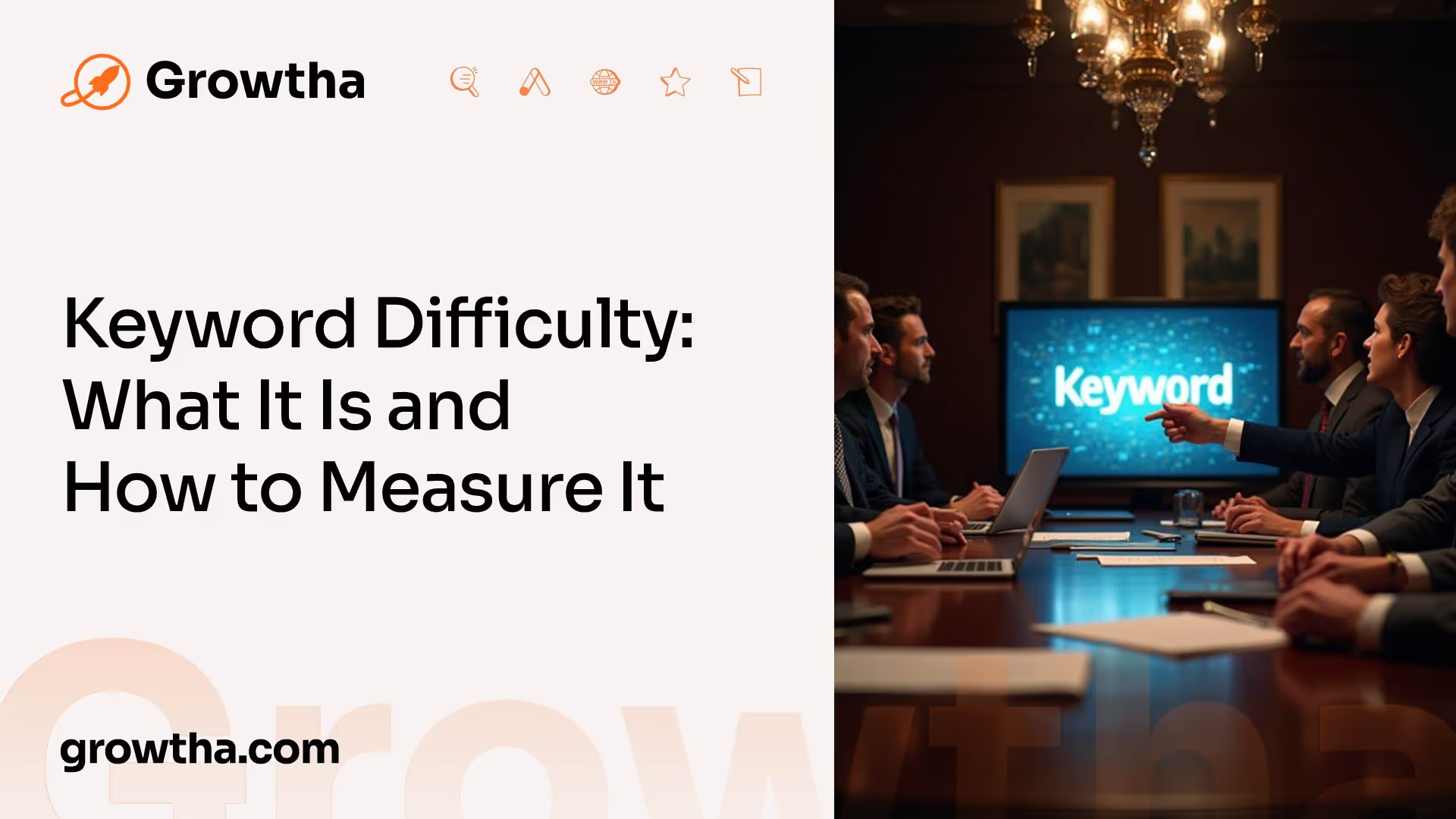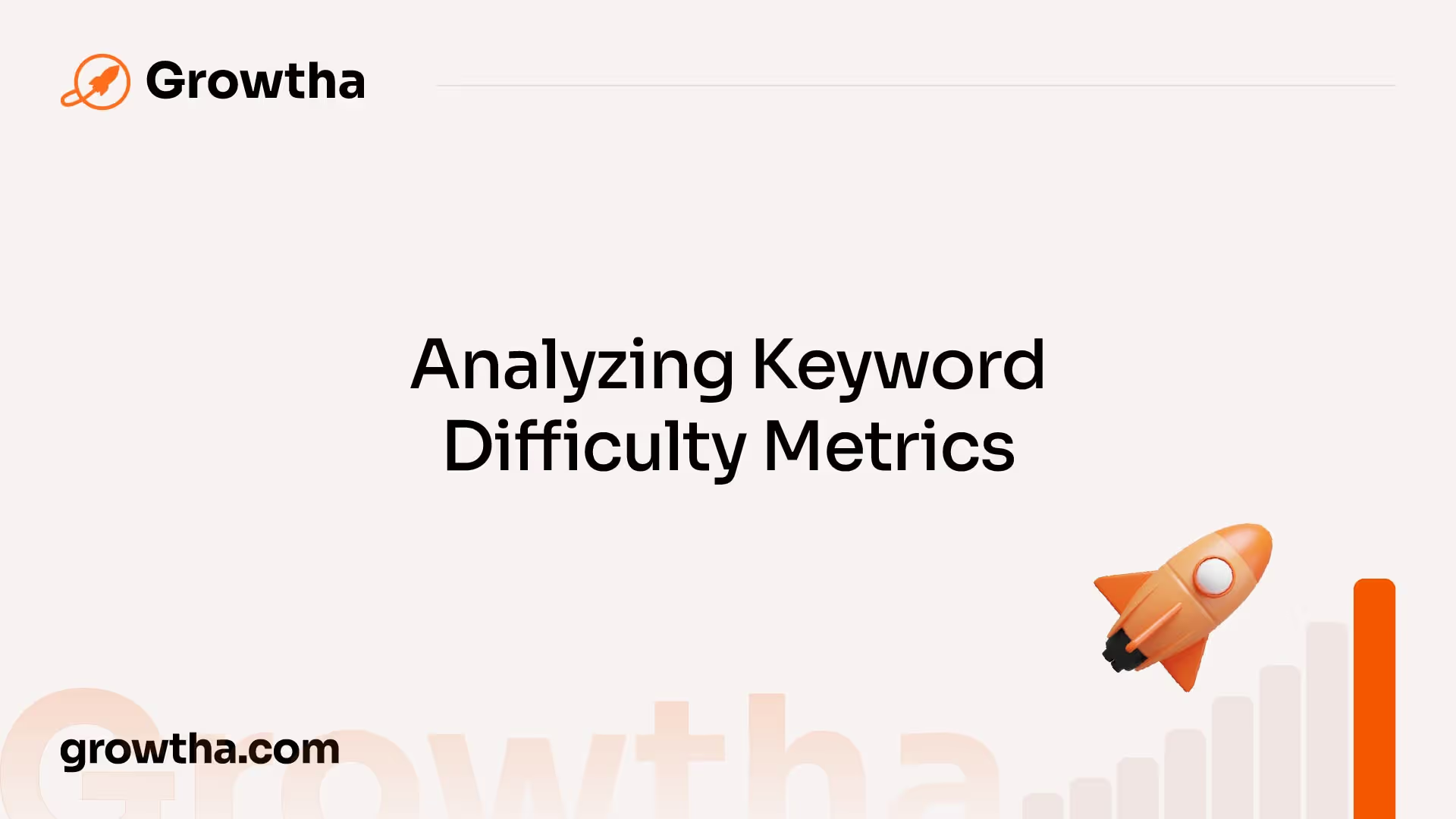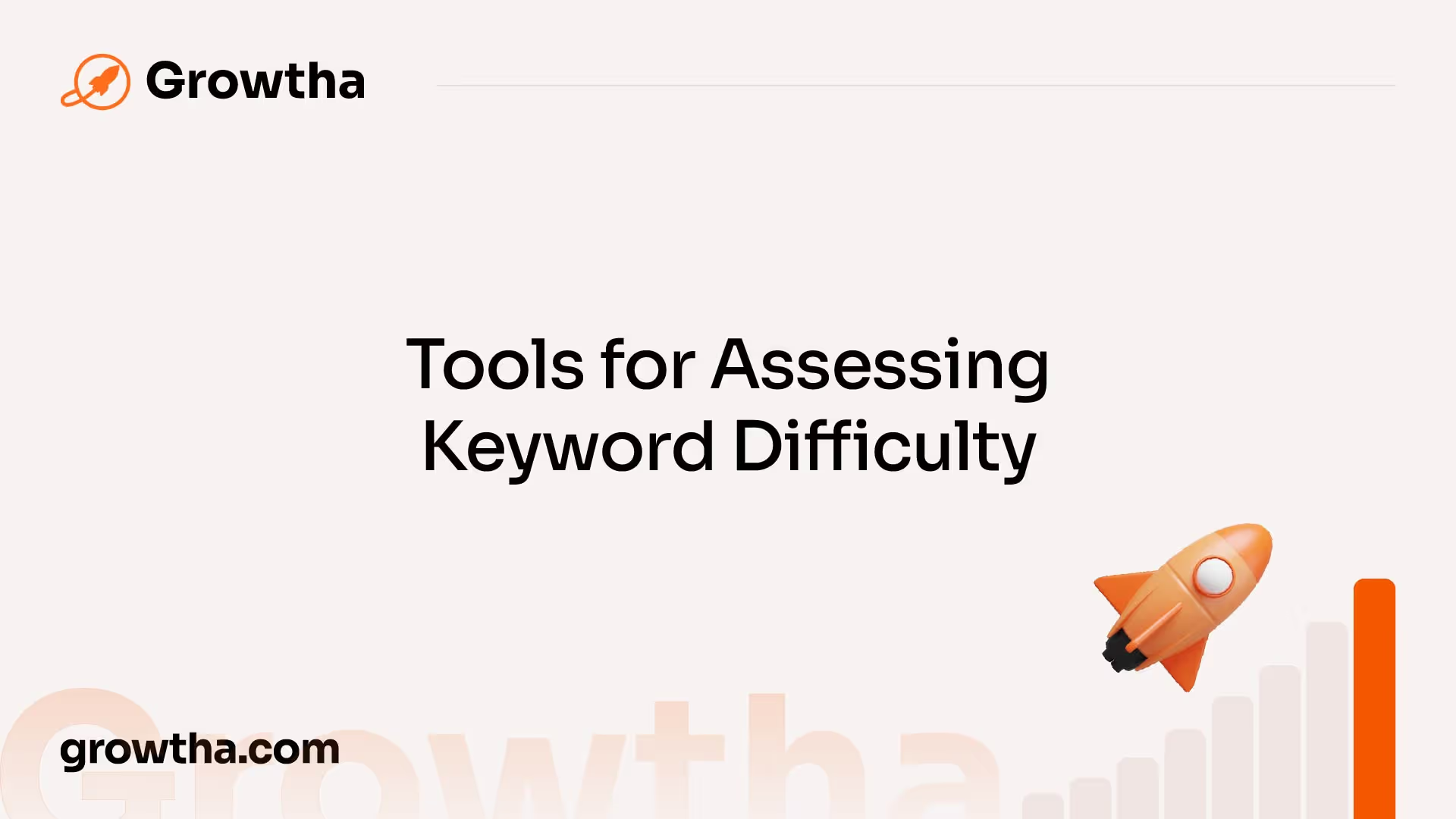Keyword Difficulty: What It Is and How to Measure It
Keyword difficulty, also known as SEO difficulty or keyword competition, is a metric that estimates the level of difficulty in achieving a prominent, unpaid position for a keyword.


Keyword Difficulty: What It Is and How to Measure It
Understanding Keyword Difficulty

To effectively navigate the world of SEO and optimize your website for search engines, it is crucial to understand the concept of keyword difficulty. This section will delve into the definition of keyword difficulty and the factors that influence it.
Definition of Keyword Difficulty
Keyword difficulty, also known as SEO difficulty or keyword competition, is a metric that estimates the level of difficulty in achieving a prominent, unpaid position for a specific search engine query. It quantifies the challenge in ranking for a particular keyword in search engine results. In the context of SEO, keyword difficulty is typically expressed as a percentage, with higher percentages indicating greater difficulty [1].
More specifically, keyword difficulty measures the level of competition for a specific keyword. It evaluates how challenging it is for your website to rank organically for that particular keyword. The higher the competition, the higher the keyword difficulty, signifying the increased effort required to achieve a favorable ranking position [2].
Factors Influencing Keyword Difficulty
Several factors contribute to the determination of keyword difficulty. Some of the key factors include:
- Domain Authority: The authority and credibility of a website's domain can impact keyword difficulty. Websites with higher domain authority tend to have an advantage in ranking for competitive keywords.
- Backlink Profile: The quality and quantity of backlinks pointing to a website significantly influence its overall authority and ability to rank for specific keywords. A strong backlink profile can lower keyword difficulty.
- Content Quality: The relevance, depth, and overall quality of the content on a website play a vital role in determining keyword difficulty. Well-optimized and informative content is more likely to rank higher for relevant keywords.
- Search Volume: The search volume of a keyword, which represents the number of searches it receives, can impact keyword difficulty. Highly popular and frequently searched keywords often have higher competition and, therefore, higher difficulty.
Understanding the factors that contribute to keyword difficulty is essential in formulating effective SEO strategies. By analyzing these factors, SEO professionals and website owners can make informed decisions when selecting keywords and developing content to improve their search engine rankings.
Importance of Keyword Difficulty

Understanding the concept of keyword difficulty is crucial for developing an effective SEO strategy. In this section, we will explore the significance of keyword difficulty and the importance of choosing the right keywords for your website.
Significance in SEO Strategy
Keyword difficulty plays a vital role in SEO strategy because it helps content teams determine the level of effort required to rank for a specific keyword. By assessing the difficulty of a keyword before diving into content development, you can better allocate your resources and plan your optimization efforts accordingly.
Keyword difficulty acts as a guide to identify the competitiveness of a keyword in search engine rankings. It allows you to assess the landscape and make informed decisions about which keywords to target. By understanding the level of competition, you can focus on keywords that offer a balance of search volume and achievable rankings [2].
Choosing the Right Keywords
Selecting the right keywords is crucial for a successful SEO campaign. Keyword difficulty helps you identify the best keywords to target. Ideally, you want to choose keywords with moderate or low competition, while also considering their search volumes.
By focusing on keywords with moderate difficulty, you can strike a balance between attainability and search volume. These keywords present an opportunity to rank well in search engine results without facing an overwhelmingly high level of competition. On the other hand, targeting low-competition keywords may provide you with quicker wins, but they often have lower search volumes [2].
When selecting keywords, it's essential to consider their relevance to your target audience and the content you provide. Conduct thorough keyword research to identify search terms that align with your business goals and resonate with your target audience. By choosing the right keywords, you can optimize your website effectively and attract organic traffic from users actively searching for the information or services you offer.
In conclusion, keyword difficulty is a crucial metric in SEO that helps guide your strategy and ensure you target keywords that offer a balance of competition and search volume. By understanding the importance of keyword difficulty and choosing the right keywords, you can optimize your website effectively and increase your chances of ranking well in search engine results.
Analyzing Keyword Difficulty Metrics

To understand keyword difficulty in SEO, it's important to analyze various metrics that play a role in determining the competitiveness of a keyword. Two key metrics that are commonly used to assess keyword difficulty are search volume and difficulty scores, as well as backlinks and authority influence.
Search Volume and Difficulty Scores
Search volume refers to the number of searches a specific keyword receives within a given timeframe. It tends to correlate strongly with difficulty scores in SEO. Higher-volume keywords have the potential to drive more traffic and attract more competition, resulting in higher difficulty scores [1].
When analyzing keyword difficulty, it's essential to strike a balance between search volume and competition. While high-volume keywords may seem enticing, they often come with greater competition, making it challenging to rank for those keywords. On the other hand, low-volume keywords may be easier to rank for, but they may not drive significant traffic to your website. Therefore, it's crucial to choose keywords that align with your SEO goals and strike a balance between search volume and difficulty.
Backlinks and Authority Influence
Backlinks and the authority of websites linking to them are crucial factors that influence keyword difficulty in SEO. The presence of backlinks to top-ranking sites and their authority scores are indicators of the competitiveness of a keyword. The stronger the backlinks to top-ranking sites and their authority scores, the higher the keyword difficulty will be.
Backlinks are links from other websites that point to your site. They serve as a vote of confidence and signal to search engines that your content is valuable and trustworthy. Websites with a high number of quality backlinks from authoritative sources are more likely to rank higher in search engine results.
When assessing keyword difficulty, it's essential to consider the backlink profiles of top-ranking websites for the target keyword. Analyzing their backlinks can provide insights into the level of competition and help you devise a strategy to build your own authoritative backlink profile.
Understanding these metrics and their impact on keyword difficulty can help you make informed decisions when selecting keywords for your SEO strategy. By considering search volume, difficulty scores, backlinks, and authority influence, you can choose keywords that strike the right balance between competitiveness and potential for driving traffic to your website.
Strategies for Targeting Keywords

When it comes to targeting keywords in SEO, employing effective strategies can make a significant difference in your search engine rankings. Two key strategies to consider are focusing on long-tail keywords and understanding the distinction between transactional and informational keywords.
Long-Tail Keywords
Long-tail keywords are longer, more specific keyword phrases that typically have lower competition levels. These keywords are highly valuable as they tend to correlate with high engagement and conversion rates. Unlike generic head terms, long-tail keywords provide a more targeted approach to addressing specific user queries.
By incorporating long-tail keywords into your content, you can attract a more specific audience that is actively searching for the information or products you offer. These keywords often have a higher intent to convert, making them ideal for driving qualified traffic to your website. Additionally, targeting long-tail keywords can help smaller sites gain visibility and establish their presence in the search engine results pages (SERPs) [3].
Transactional vs. Informational Keywords
Understanding the distinction between transactional and informational keywords is crucial for developing a well-rounded keyword strategy.
Transactional keywords indicate a strong intent to buy or take immediate action. These keywords are highly valuable when planning an SEO or PPC strategy, as they target individuals who are ready to make a purchase or engage in a specific transaction [4]. Examples of transactional keywords include phrases like "buy now," "discount," or "best price."
On the other hand, informational keywords are used by individuals seeking to learn or gather information. These keywords are often higher up in the marketing funnel, indicating that users are in the early stages of their buying journey and may not be ready to make an immediate purchase [4]. Examples of informational keywords include phrases like "how to," "benefits of," or "guide to."
A well-balanced keyword strategy should incorporate both transactional and informational keywords. While transactional keywords can directly drive conversions, informational keywords can attract users who are in the research phase. By providing valuable and informative content, you can establish your expertise and build trust with potential customers.
By implementing these strategies, you can improve the effectiveness of your keyword targeting efforts. Remember to conduct thorough keyword research, analyze search volume and difficulty scores, and optimize your content accordingly. With a strategic approach to keyword targeting, you can enhance your organic visibility and attract the right audience to your website.
Tools for Assessing Keyword Difficulty

When it comes to measuring keyword difficulty in SEO, there are various tools available that can provide valuable insights and assist in making informed decisions. These tools help marketers and SEO professionals assess the level of competition for specific keywords, enabling them to develop effective strategies. Let's explore two popular types of tools used for this purpose: keyword research tools and difficulty score comparisons.
Popular Keyword Research Tools
Keyword research tools play a vital role in identifying potential keywords to target in SEO campaigns. These tools generate keyword ideas based on exact match and phrase match keywords, helping marketers uncover relevant terms that their target audience is searching for. Some well-known keyword research tools include:
These tools provide comprehensive data and keyword suggestions, empowering SEO professionals to optimize their strategies and target keywords with the right level of difficulty.
Comparing Difficulty Scores
Different keyword research tools employ varying methods to measure keyword difficulty, making it essential to identify the most accurate tool for assessing competition levels. Tools like Moz's Domain Authority or Ahrefs' Domain Rating provide authority-based scores, which offer a general measure of a website's overall strength and influence in the search results. However, these scores may not provide a nuanced understanding of keyword difficulty.
For a more actionable difficulty score, tools like SEMrush utilize a comprehensive approach that considers factors such as content quality, backlinks, and on-page optimization. This approach provides a more refined measurement of keyword difficulty, allowing marketers to gauge the level of effort required to rank for a particular keyword [5]. It's important to select a tool that aligns with your specific needs and provides the most accurate assessment for your SEO strategy.
By leveraging keyword research tools and comparing difficulty scores, SEO professionals can gain valuable insights into keyword competition. These insights aid in identifying high-potential keywords and developing effective strategies to optimize content, build backlinks, and increase search engine visibility. Remember that keyword difficulty is not the only factor to consider when choosing keywords; relevance, search volume, and user intent should also play a significant role in your decision-making process.
Enhancing Content for Competitive Keywords
When targeting competitive keywords in SEO, it's essential to employ strategies that enhance the content's visibility and relevance. This section will explore two key approaches: content quality and optimization, as well as link profiles and competitor analysis.
Content Quality and Optimization
Content quality plays a crucial role in ranking for competitive keywords. Top-quality content is not only informative and engaging, but it also provides value to users, making it more likely to attract organic traffic and earn high-quality backlinks. Creating comprehensive, well-researched, and unique content is key to outperforming existing top results [5].
To optimize content for competitive keywords, it's important to include the target keyword strategically throughout the content. However, it's crucial to maintain a natural and reader-friendly flow. Keyword stuffing should be avoided, as search engines now prioritize user experience and penalize over-optimization. Instead, focus on incorporating the target keyword in the page title, headings, meta tags, and within the body of the content in a way that feels organic.
In addition to keyword optimization, pay attention to other on-page elements such as meta descriptions, image alt tags, and internal linking. These elements contribute to the overall optimization of the content and can improve its visibility in search engine results.
Link Profiles and Competitor Analysis
Evaluating link profiles, content optimization, and content quality are crucial steps in understanding keyword difficulty and determining the competitiveness of keywords in SEO. Analyzing the backlink profiles of top-ranking pages for your target keywords can provide valuable insights into the types of websites and sources that are linking to them.
By conducting competitor analysis, you can identify the strengths and weaknesses of your competitors' SEO strategies. Look for opportunities to acquire high-quality backlinks from authoritative websites that link to your competitors. This can be achieved through outreach campaigns, guest posting, or creating link-worthy content that naturally attracts backlinks.
Furthermore, analyze the content strategies of your competitors. Identify the topics they are covering, the format of their content, and any gaps that you can fill with your own unique and valuable content. By understanding the content landscape, you can create content that stands out and provides a better user experience.
Remember, keyword difficulty is not solely determined by content and link profiles. Other factors such as search volume, domain authority, and relevance also play a role. Continuously monitoring and refining your SEO strategy based on keyword performance and competition is crucial for long-term success.
Enhancing content for competitive keywords requires a comprehensive approach that focuses on both content quality and optimization, as well as understanding and leveraging link profiles and competitor analysis. By consistently improving these aspects, you can increase your chances of ranking well for competitive keywords and driving valuable organic traffic to your website.
References
[1]: https://www.semrush.com/blog/keyword-difficulty/
[2]: https://www.spyfu.com/blog/what-is-keyword-difficulty/
[3]: https://moz.com/learn/seo/what-are-keywords
[4]: https://www.semrush.com/blog/types-of-keywords-commercial-informational-navigational-transactional/







